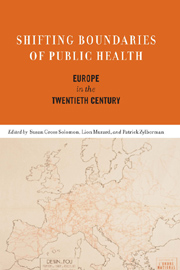Book contents
- Frontmatter
- Contents
- Preface
- Introduction
- Part One Place as Politics
- 1 Can There Be a Democratic Public Health? Fighting AIDS in the Industrialized World
- 2 The Social Contract of Health in the Twentieth and Twenty-First Centuries: Individuals, Corporations, and the State
- Part Two Carving Out the International
- Part Three Preserving the Local
- Part Four Navigating between International and Local
- Selected Bibliography
- List of Contributors
- Index
1 - Can There Be a Democratic Public Health? Fighting AIDS in the Industrialized World
from Part One - Place as Politics
Published online by Cambridge University Press: 12 September 2012
- Frontmatter
- Contents
- Preface
- Introduction
- Part One Place as Politics
- 1 Can There Be a Democratic Public Health? Fighting AIDS in the Industrialized World
- 2 The Social Contract of Health in the Twentieth and Twenty-First Centuries: Individuals, Corporations, and the State
- Part Two Carving Out the International
- Part Three Preserving the Local
- Part Four Navigating between International and Local
- Selected Bibliography
- List of Contributors
- Index
Summary
During the nineteenth century, the connection between politics and public health was clear. In the heroic era of sanitary reform, reformers broke ground for new and, from a liberal point of view, drastic interventions. Private property rights were limited in the name of sanitary infrastructure. Individual behavior was curbed and controlled in the interest of public salubrity. The controversy over smallpox vaccination—a classic contest between individual and public goods—was one of the major political battles of the nineteenth century, though curiously forgotten now. The disputes over the Contagious Disease Acts during the 1880s laid the foundations for the women's movement, providing a dress rehearsal for disputes over suffrage a few years later.
In the intervening century, however, public health became a victim of its own success. It became taken for granted, a matter of everyday, uncontroversial political decision making. No longer were there Chadwicks, Virchows, Pasteurs, or Kochs—reformers and scientists whose exploits made them heroes. No longer were there controversies, except at the margins of politics, as with the decision on mass roundups and other measures against prostitutes during the two world wars. One exception to this rule was the grotesque inversion of public health by the Nazis. They exploited the rhetoric of public health to provide an aura of scientific respectability for hatred and genocide. Hitler portrayed himself as the Robert Koch of politics and the Jews as dangerous microorganisms to be exterminated.
- Type
- Chapter
- Information
- Shifting Boundaries of Public HealthEurope in the Twentieth Century, pp. 23 - 44Publisher: Boydell & BrewerPrint publication year: 2008

